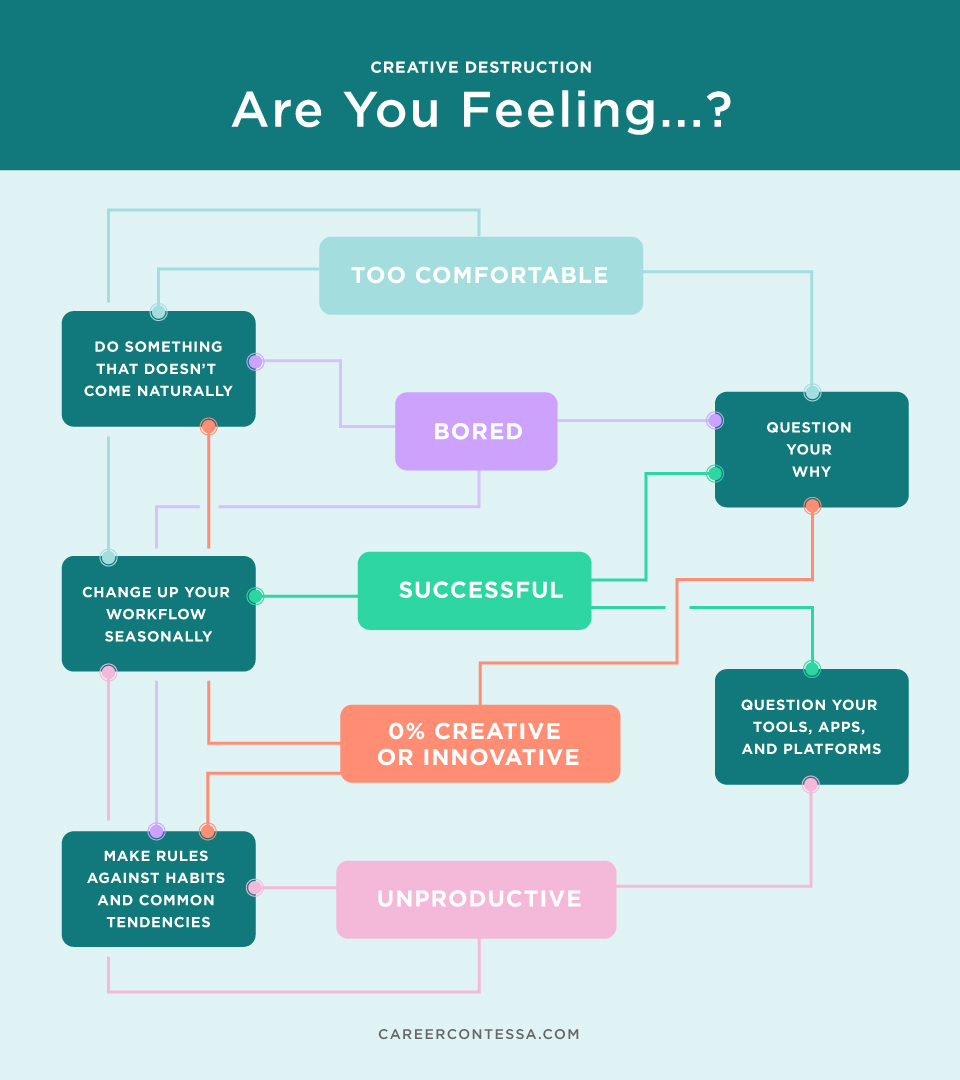For that reason, I’m not totally sure where I first heard the term “creative destruction,” but I definitely learned what it meant from Jason Fried’s 99U video—at least, his version of it.
What Is Creative Destruction?
As we settle into our careers, we tend to let our routines and processes calcify. Because most of us have an “if it ain’t broke, don’t fix it” mentality, we avoid change unless it’s clear change is necessary. If everything’s working, why not keep going, right?
Fried’s version of creative destruction turns that idea on its head. Instead of sticking with the status quo, you deliberately tear down what you’ve built, forcing yourself to find new ways to approach your day-to-day work. Why? Because it makes you more innovative in the long run. Says Fried:
“As your career goes on and as your business grows, if you’re self-employed or you’re an entrepreneur, you’re going to find yourself in these moments when you begin to protect the things that you do and the things that you’ve done versus destroy those things. And the more and more you protect, the more rigid you become, and the harder it becomes to actually do anything creative.”
Creative destruction is the anti-status quo.
Fried didn’t invent the concept—actually, you can date it back to the early days of entrepreneurship. Joseph Schumpeter, an economist who died nearly 70 years ago, coined the term to explain why an entrepreneur intentionally causes instabilities in the economy in order to innovate. Explains a 2000 New York Times article:
“Those instabilities he attributed to the principle of ‘creative destruction,’ a process in which new technologies, new kinds of products, new methods of production and new means of distribution make old ones obsolete, forcing existing companies to quickly adapt to a new environment or fail.”
Think of how Uber blew up the taxi industry by introducing a totally new approach: ridesharing. It’s about destroying what we view as normal (even if that normal works just fine) in order to put something more innovative in its place.
Why Does It Matter?
Says Fried, “The idea is that you need to look regularly at things that you’re doing that you’ve become so comfortable with that you don’t even question anymore, and question the hell out of those things. Because I promise you, you’re doing something that if you looked back on it, you’d go, that’s ridiculous. But you’re so close inside of it, you’re so used to it, that you don’t recognize that you’re doing something a little bit too common.”
So how do you do it in your own life?

How to Use Creative Destruction in Your Own Work
Approach Your Work in Seasons
We don’t do that now. Even if we take a vacation, we come back to the same 9-to-5 activities we left before our trip. And that’s a big problem for innovation.
That’s why Fried suggests enforcing seasons—think of them as transitional periods more than temperature changes—in your own work. For the team at Basecamp, that meant implementing summer hours, where the whole team works less than 40 hours a week (yes, really). Says Fried:
“May through October, we do these four-day work weeks, and people look forward to the moment of the change of schedule, and they work a little bit less in the summer, enjoy the outdoors a bit more, and then get back into work in the fall. And when that happens, when there’s a forced change in the way you work on a regular basis, you create moments to come back to something and look at something fresh, and look at something a little bit differently.”
Creating transition periods can upset standards and clear the way for better thinking. Here are some ways that you can use season in your own work:
- Plan for a season of self-education. Set up a curriculum, either by taking online classes or simply by dedicating a season to reading as much as you can on a particular topic. Set coffee dates or informational interviews up. Do everything you can in three months to become an expert on a new topic
- Dedicate the winter to a side hustle. Those months where you normally hunker down at home? Use those hours to make some extra money after regular work hours instead of focusing on Netflix
- Focus a season on paying down debt. See how much you can cut back, just for a finite period to finally pay off that credit card or student loan
Critique Your Tools, Apps, and Platforms
Do Something That Doesn’t Come Naturally
Make Rules Against Habits and Common Tendencies
Question Your Why
What are some other ways you’ve used creative destruction?










